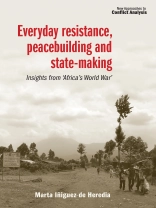This electronic version has been made available under a Creative Commons (BY-NC-ND) open access license.
Everyday resistance, peacebuilding and state-making addresses debates on the liberal peace and the policies of peacebuilding through a theoretical and empirical study of resistance in peacebuilding contexts. Examining the case of ‘Africa’s World War’ in the DRC, it locates resistance in the experiences of war, peacebuilding and state-making by exploring discourses, violence and everyday forms of survival as quotidian acts that attempt to challenge or mitigate such experiences. The analysis of resistance offers a possibility to bring the historical and sociological aspects of both peacebuilding and the case of the DRC, providing new nuanced understanding on these processes and the particular case. The book also makes a significant contribution to the theorisation of resistance in International Relations.
Inhoudsopgave
Abbreviations Chronology Introduction. Resistance and the liberal peace: A missing link 1. Legitimacy, violence and extraction in the practice of building states 2. Patterns and practices of everyday resistance: a view from below 3. History and present of ‘Africa’s World War’ 4. Claims to legitimate authority and discursive Attacks 5. Everyday violence and Mai Mai Militias in Eastern DRC 6. Creative survival as subversion 7. Everyday resistance and everyday order in world politics Bibliography Index
Over de auteur
Marta Iñiguez de Heredia is Marie Sklodowska Curie Fellow at the Institute Barcelona d’Estudis Internacionals












